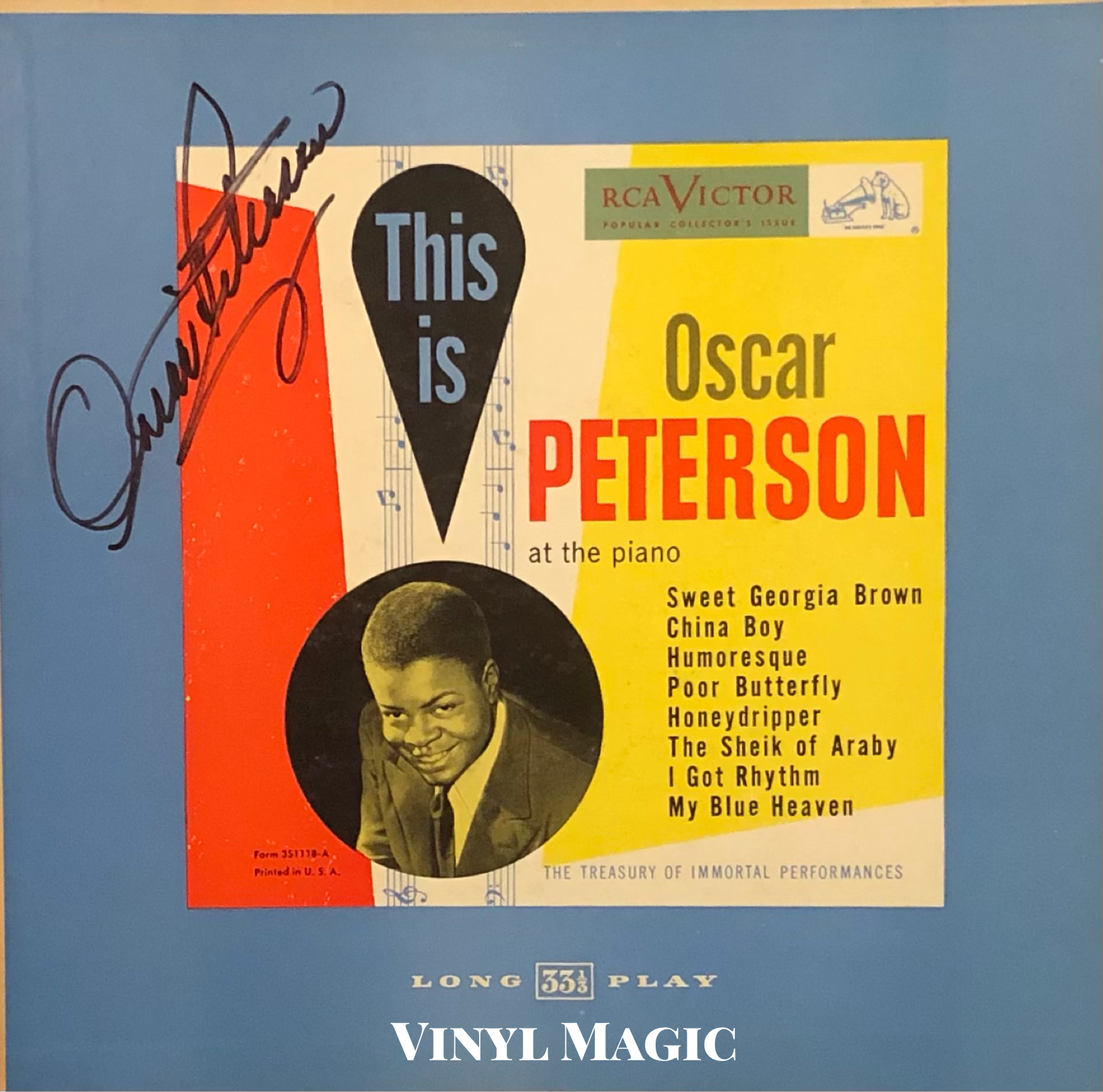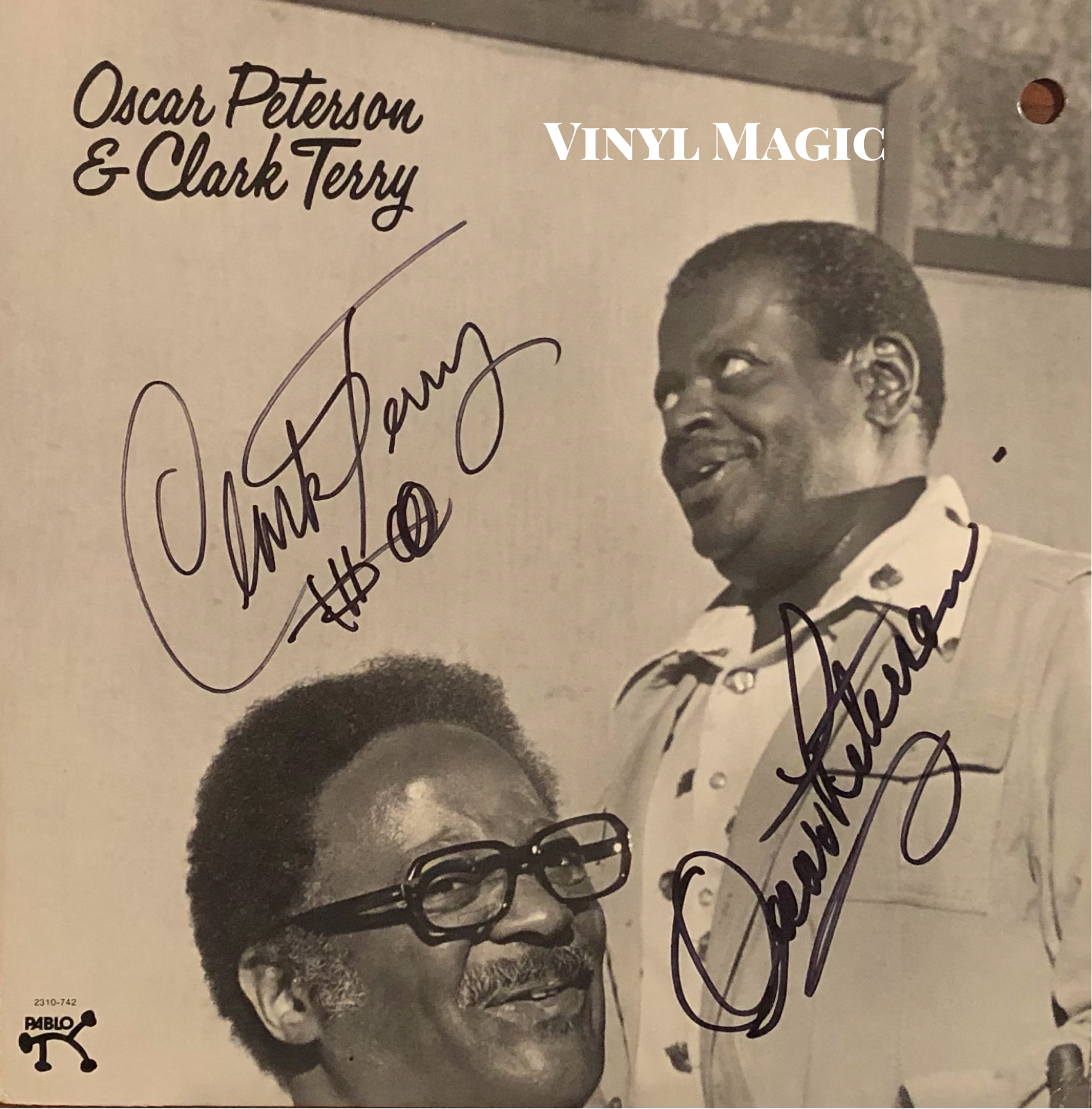Oscar Peterson and Me…
A jazz phrase to me can’t be a jazz phrase without a certain type of blues feeling to it. If someone tries to play the blues, that’s the quickest way of knowing where they’re at jazz-wise, in my book. I have seen so-called prolific players humbled by the simplest of players who could play the blues… I’m not ashamed of the blues. The blues is a definitive part of jazz history and of my playing, and I want it to stay that way. I don’t want it to ever change, because if it does, then it throws me in with the classical end, and that’s not what I’m doing.
Oscar Peterson 1980
This Is Oscar Peterson (10” vinyl 1945) signed by Oscar
Some people try to get very philosophical and cerebral about what they're trying to say with jazz. You don't need any prologues, you just play. If you have something to say of any worth, then people will listen to you.
Oscar Peterson
Oscar Peterson Quartet (1952) signed by Oscar
The " 'will to perfection' ...seems especially prevalent in jazz musicians. Creating an uninhibited, off-the-cuff musical composition in front of a large audience is a daredevil enterprise. . . . It requires you to collect all your sense, emotions, physical strength and mental power, and focus them totally onto the performance -- utter dedication, every time you play. And if that is scary, it is also uniquely exciting: Once it's bitten you, you never get rid of it.
The Duke Ellington Songbook (1960) signed by Oscar, Ray Brown, Ed Thigpen
Too many jazz pianists limit themselves to a personal style, a trademark, so to speak. They confine themselves to one type of playing. I believe in using the entire piano as a single instrument capable of expressing every possible musical idea. I have no one style. I play as I feel.
Louis Armstrong Meets Oscar Peterson (1957) signed by Oscar
Oscar Peterson is one of the most celebrated jazz pianists, releasing hundreds of recordings and winning eight Grammys in his storied career. Born in Montreal, Oscar was classically trained, studying the etudes of Debussy and Chopin, until he fell in love with the improvisatory stylings of jazz in general, and Art Tatum in particular. He left school at seventeen (with his parents' blessings) to play professionally with the Johnny Holmes Orchestra in Canada. Initially, he spurned offers from bandleaders Coleman Hawkins and Jimmy Lunceford to join their bands. Instead, Oscar made his US debut in 1949 at Carnegie Hall with Norman Granz' Jazz At The Philharmonic. Oscar caused quite a sensation and the recordings with Charlie Parker, Benny Carter, Coleman Hawkins and many others were subsequently released. Thus began Oscar's more than thirty year collaboration with the impresario and record label owner Norman Granz.
Jam Session #1 (1952) signed by Oscar, Ray Brown, Benny Carter
Quincy Jones, a close friend and admirer, recalled Oscar's first show, "Back in the day, those 'Jazz at the Philharmonic' shows were like the big stadium shows we have today. In fact, that's what got them started. And one year we heard a rumor that Norman Granz had a piano player that he was getting ready to expose . . . to the audience. Well, the joke from people who had heard him was that Oscar used to drink jet fuel and eat gunpowder every morning, because when he came up, he had everybody listening. He was a genius."
The History Of An Artist (1974) signed by Oscar - no one rocked crushed velour polka dot slacks harder!
The first time I saw Oscar Peterson perform he was at Symphony Hall in Boston in the early 1980s. It was a solo performance and his playing was revelatory: ripping off thunderous runs with either hand, at times lyrical and delicate, at others forceful and resounding. It seemed as though there were four hands playing the keyboard, much like his hero, friend and fellow virtuoso, Art Tatum. Oscar was far too modest to accept the comparison and dismissed the linkage. " I don’t know what being the next Art Tatum means. There never was and never will be another Art Tatum. If I’m an extension of his thinking, fine. But I didn’t set out to be that....Musically speaking, he was and is my musical God, and I feel honored to remain one of his humbly devoted disciples." I saw Oscar perform many times through the years but there was nothing like the fury and purpose of that first solo concert.
Canadiana Suite (1964) signed by Oscar, Ed Thigpen
In 1993, Oscar suffered a debilitating stroke and rigorous therapy over the next two years helped him recover some, but not all of the facility in his potent left hand. All those years of practicing six or more hours per day put Oscar in good stead. For me, it was hard to tell his infirmity when I saw him play post 1995. Oscar said it was actually a blessing, as he learned to not play as many notes. He admitted, "I still can't do some of the things I used to be able to do, but I've learned to do more things with my right hand. And I've also moved in a direction that has always been important to me, toward concentrating on sound, toward making sure that each note counts." As fellow pianist Benny Green wisely observed in 2001, "Oscar can do more with one hand than many pianists can do with two."
Very Tall (1962) signed by Oscar, Milt Jackson
In November 1998, I took a colleague (and musician) from work to see Oscar perform with the Very Tall band at the Blue Note in New York City. Milt Jackson and Oscar had released a 1962 Very Tall recording to critical acclaim and they reconstituted the band thirty six years later to revisit a live recording. We got to the club early and before the show, I met with Milt, Oscar and Ray Brown as I had many times through the years and secured their signatures. Oscar, as always, was warm and genial. He was a big man, 6'3", well over two hundred fifty pounds, and my hand disappeared in his bear claw. When I returned to our table, Joel admired my cache. He said, "You know, my dad's favorite pianist is Oscar Peterson. I wish I had an album I could get signed for him." I knew Joel's dad was battling cancer at his home in Louisville, Kentucky and I thought this would be a nice gift. "Joel, there's a record store across the street. Let's see if they have any Oscar for sale?" So we left the Blue Note and ran across the street to Bleecker Bob's, a Greenwich Village landmark.
Swinging Brass (1959) signed by Oscar, Ray Brown, Ed Thigpen
Bleecker Bob's was a dour, musty record store with creaky wooden floors that specialized in imports, bootlegs, and punk rock. It started as Village Oldies in 1967 at 133 Bleecker Streetbefore moving in 1981 to the West 3rd Street location across from the Blue Note. It was particularly notable as the store where guitarist Lenny Kaye worked and Patti Smith hung out in the early 1970s. As Lenny remembered, "She came up to the counter and said, 'Listen, I'm doing a poetry reading at St, Mark's Church in a few weeks. I hear you play a little guitar, and I'd like to shake it up, so why don't you accompany me on a couple of poems?' And from that little acorn, a beautiful towering oak was born." And the course of punk rock was undeniably altered. Bleecker Bob's also had club hours, staying open until 3am on weekends, perfect for some late night browsing after nocturnal carousing. Their jazz selection was modest but adequate, and Joel purchased two Oscar Peterson albums.
Oscar Peterson Trio + One (1964) signed by Oscar, Ray Brown, Ed Thigpen, Clark Terry
We returned to the club and I escorted Joel to the dressing room. The door was closed. Joel was hesitant, "I don't know if I should knock on the door." I looked him straight in his eyes and grabbed his shoulders, "Listen, Joel. You are a salesman and a partner in a Wall Street firm. You have no trouble asking a bank CEO to restructure his balance sheet and portfolio. You want Oscar's signature, go in there and sell it. You can do this." I stepped aside, Joel knocked on the door, he went in and ten minutes later, he emerged with the signed albums and the biggest smile. Ever. It was one of my best trades on Wall Street!
We Get Requests (1964) signed by Oscar, Ray Brown, Ed Thigpen
The show was recorded and the performances of Milt Jackson, Ray Brown, Oscar Petersonand Karriem Riggins were remarkable. They played Benny Golson's elegiac ode to Clifford Brown, "I Remember Clifford", a jaunty "Nature Boy" from the Nat King Cole songbook featuring Milt Jackson stretching out on vibraphone, and the sublime solo piano on Oscar's "When Summer Comes." The encore was a percussive-fueled "Caravan" from the pen of Duke Ellington, fulfilling Oscar's dictum (from a 1979 interview), "I always try to include some Ellington in every concert that I do. I think it’s almost mandatory." It was a memorable show and I am thankful that the tapes were rolling and a CD was released in 1999 which commemorates the festive and swinging occasion.
A Jazz Portrait Of Frank Sinatra (1959) signed by Oscar
Near the end of his career, Oscar said, "When I sit down to the piano, I don’t want any scuffling. I want it to be a love affair."
Beauty, elegance and love radiated in the music of Oscar Peterson and it was shared freely with his fans, especially fathers, mothers, sons and daughters. There was never any scuffling.
This Is Ray Brown (1958) signed by Oscar, Ray Brown
Soul Espanol (1966) signed by Oscar
Reunion Blues (1971) signed by Oscar, Ray Brown, Louis Hayes, Milt Jackson
Choice Oscar Peterson cuts (per BK's request)
https://www.youtube.com/watch?v=tCrrZ1NnCuM
"Hymn To Freedom" Oscar Takes Us To Church 1964
https://www.youtube.com/watch?v=NTJhHn-TuDY
"C Jam Blues" Oscar Plays Duke Ellington 1964
https://www.youtube.com/watch?v=2AfvRGOCvpU
"Someday My Prince Will Come" Oscar and Milt 1971
https://www.youtube.com/watch?v=6fehMmwL138
"I Remember Clifford" Oscar, Milt, Ray at The Blue Note 1998
https://www.youtube.com/watch?v=wECMGQ8eDKM
"Satisfaction" Oscar and Milt Play The Rolling Stones 1971
https://www.youtube.com/watch?v=ALOHcDE4mdk
"Love Ballade" Oscar 1987
https://www.youtube.com/watch?v=q2qifGhYBUw
"When Summer Comes" Oscar Live
Oscar Peterson & Clark Terry (1975) signed by Oscar, Clark Terry
Oscar Peterson & Jon Faddis (1975) signed by Oscar, Jon Faddis
Watch And Josh…Again (1975) signed by Oscar

















